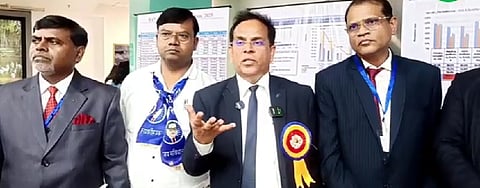
New Delhi: In a powerful display of collective concern, engineers and professionals from the Dalit community gathered recently from across India at the national convention of the Babasaheb Ambedkar National Association of Engineers (BANAE). The two-day event, held on 21-22 September at New Delhi, to mark the organization's 38th foundation year, became a platform for a data-driven critique of the implementation of government policies, highlighting a stark gap between planning and ground-level execution.
The convention saw participation from nearly 350 engineers and professionals from 23 states, who engaged in intense discussions on critical issues like education, employment, health, and economic empowerment.
Speaking with The Mooknayak, BANAE's Secretary General, Sanjay Sagar, outlined the primary goal of the gathering. "Our issue was to understand the role of our intellectual group, our engineers," Sagar stated. "They have gathered from 23 states. Their role is to figure out how we can approach society and the government to further the idea of inclusive growth, so that society can benefit. We have problems, and we want solutions."
He emphasized that the focus was on a factual analysis of government action. "Our aim has been to make people understand what the government's planning and policies are, what the framework is, and what the implementation status is. We discussed the facts and deliberated on how to develop society, how to develop the mindset of the society, and on many student-related issues."
Sagar detailed that the discussions were comprehensive, covering the intended role of the community, the government's responsibilities, and constitutional provisions. The underlying theme was to bridge the disconnect between policy intent and outcomes.
A central and alarming point of discussion was the recent data on education. Sagar presented an analysis based on figures from UDISE+ (Unified District Information System for Education), calling the trends "shocking."
"The data that emerged shows how, for decades, the rights of the Dalit, oppressed, and backward classes are being usurped," he asserted. "This discussion is based on the government's own data."
He provided a detailed breakdown: "In 2018-19, the total number of children aged 3 to 17 was 37 crore 83 lakh, but the enrollment was merely 26 crore 3 lakh. And by 2023-24, this enrollment dropped to 24 crore 80 lakh. The straightforward point is, if the population is increasing and enrollment is decreasing, it is a major cause for concern."
This data analysis led to a key resolution emerging from the convention. Sagar explained, "The main topic of discussion was that if the population is growing, we must approach the government to establish more and better schools for our children's education and facilities, so that they can get opportunities for education. This was our aim."
A positive development at the convention was the presence and commitment of Faggan Singh Kulaste, Chairman of the Parliamentary Committee for the Welfare of Scheduled Castes and Scheduled Tribes.
"The most positive aspect was that Mr. Kulaste attended our event," Sagar shared. "He answered questions on many issues with candour and assured us that he is always with the society. He said he would act as a medium between us and the government to find solutions to these problems."
When asked about the way forward, Sagar was clear about the strategy. "In our future strategy, we want to approach the current government. We want to create a pressure group and tell them that your planning and policies are very good, but inclusive growth is not happening at the grassroots level."
He pinpointed the problem at the implementation stage. "The people who are implementing these policies have a mindset of exclusivity, and they are creating exclusion. Because of this, the implementation at the ground level is not being completed."
Quoting Dr. B.R. Ambedkar, he added, "The constitution will prove good if the people implementing it are good. In today's date, where the implementers are good, we have seen good implementation of government policies. But in many places, most places, there are people with an old mindset who are not giving opportunities to others, which is creating a hurdle in systemic change."
Concluding his perspective, Sagar made an appeal to view the nation's youth as a vital asset. "If the population is increasing and enrollment is decreasing, the government should reassess and review the gap between the Right to Education and the National Education Policy," he urged.
He highlighted the demographic dividend, stating, "In our country, if 66%... two-thirds of the population is under 34 years of age, and our country is called Youth India... if we capitalize on this youth, give them good training and good education, then why can't we capitalize on them, send them abroad and earn revenue from them, just like other countries are doing? We will try to work on this as well."
The BANAE convention has marked a significant moment, presenting the organized, data-driven, and strategic voice of the educated Dalit professional class, a voice that is no longer limited to grievances but is moving forward with a clear agenda for policy reform and effective implementation.
You can also join our WhatsApp group to get premium and selected news of The Mooknayak on WhatsApp. Click here to join the WhatsApp group.